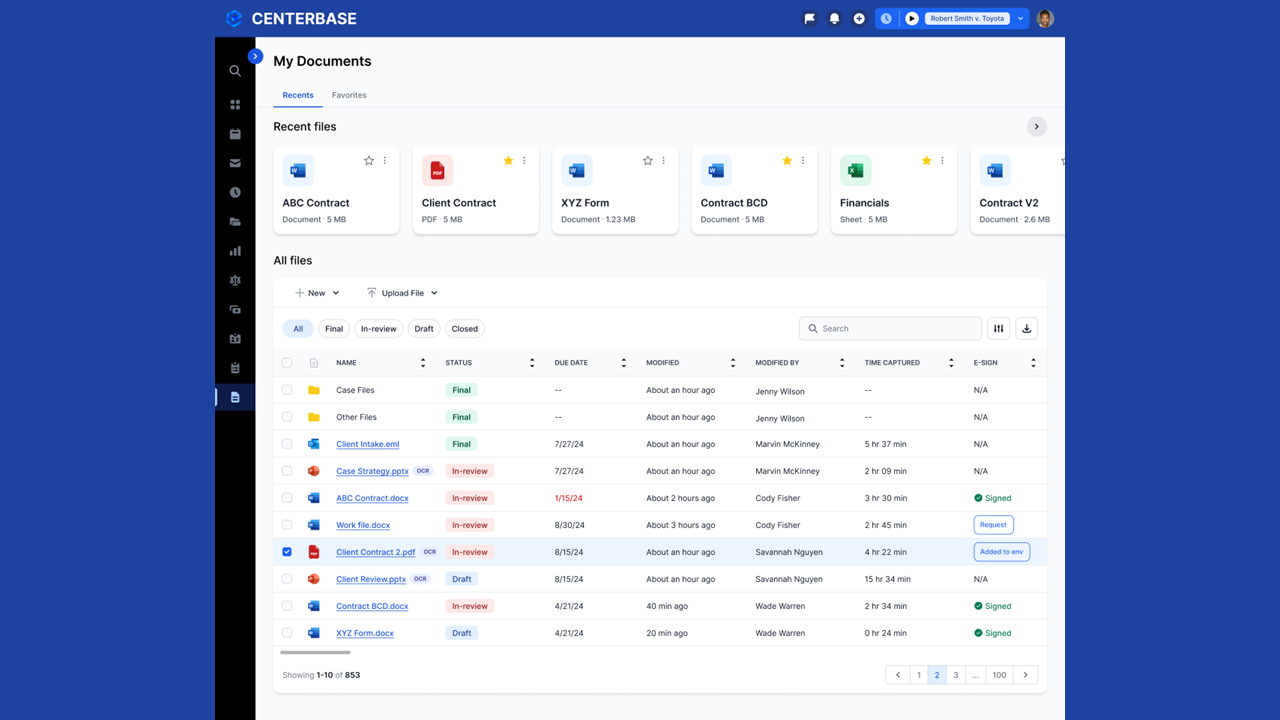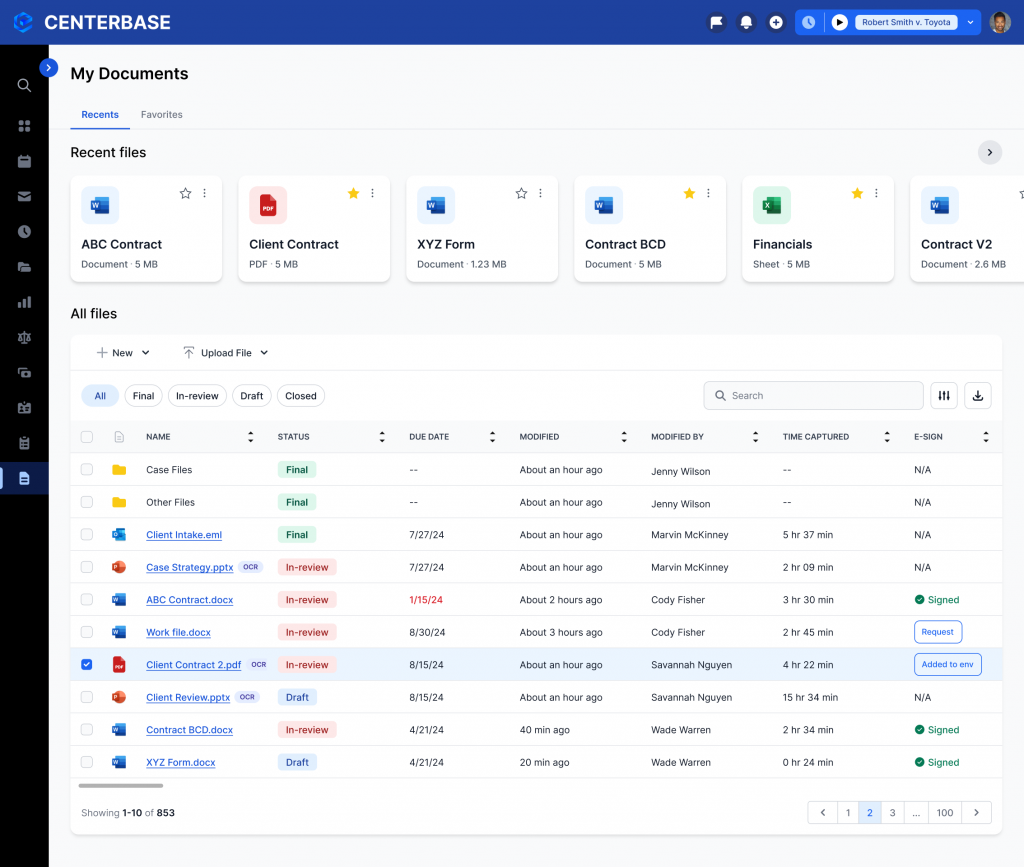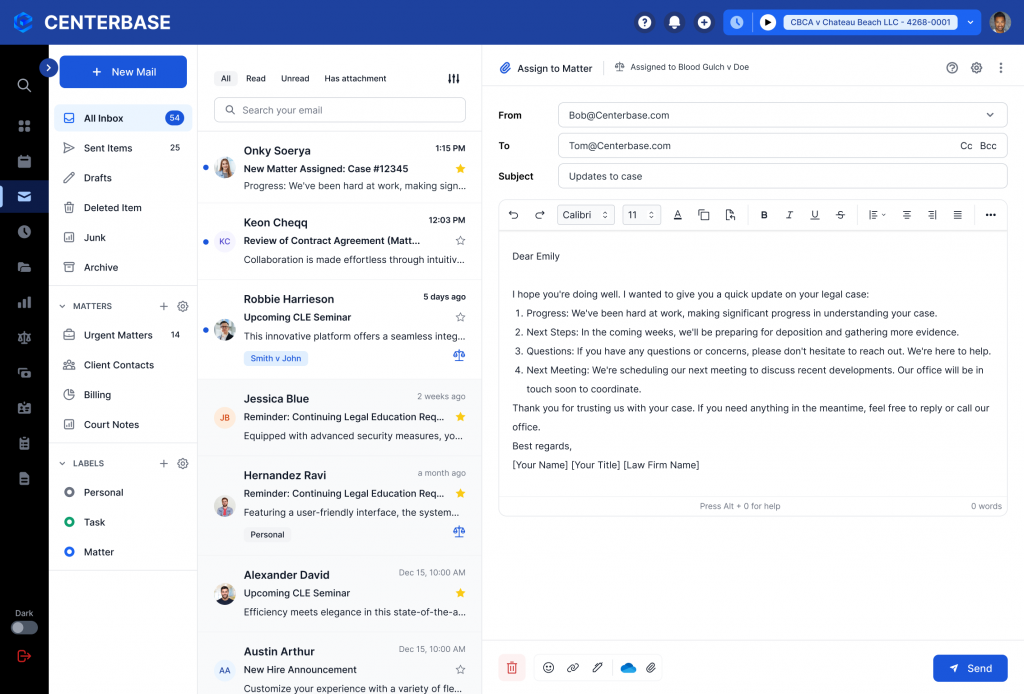Centerbase, a company that provides a cloud legal practice management platform for mid-sized law firms, today announced the beta launch of native document management, integrated directly within its platform. Leveraging Microsoft SharePoint as the underlying technology, it allows users to create, share, store and manage documents without leaving the platform.
“Until now, best-in-class document management for law firms were stand-alone, paid solutions,” the company said. “Centerbase has created a native solution that supports firms’ comprehensive document management processes, leveraging the power of the Microsoft ecosystem.”
By adding document management, Centerbase says, it is furthering its ability to provide legal professionals with an all-in-one platform where they can work efficiently without having to switch between applications. And by building it based on the familiar Microsoft technology firms already use, it says, it is providing intuitive workflows that will enable firms to quickly realize its benefits, drive user adoption, and build on existing technology investments.
Learn more about Centerbase at the LawNext Legal Technology Directory.
During a demonstration of the document management system earlier this week, Rob Joyner, senior vice president, business development, told me that the company also sees the launch as a step towards “future-proofing” its customers so that they will be prepared to take advantage of artificial intelligence and other advances in technology.
“Covid made people move to the cloud faster than anything else and faster than we all anticipated,” Joyner said. “Now AI is causing shifts and interest in legal tech again. So what we’re really trying to do is make sure we’re future proofing and setting up our customers so they’re ready to make that change and bring that technology in when it’s time to do so.”
Leveraging SharePoint
Prior to today’s launch, Centerbase already had basic document management, but it was more of a document repository than a true DMS. Centerbase also enabled — and will continue to support — API integrations with the DMS platforms NetDocuments and iManage.
But now, the native file explorer system within Centerbase can be pointed to SharePoint, so firms can take advantage of the space in SharePoint that they already pay for, but with full integration with matters, workflows and other features of Centerbase.
For users, that means they now have document-management features such as version control, OCR, and e-signatures. Their documents can now be part of automated workflows within Centerbase to save and generate documents. Users can track their time while working on documents using Centerbase’s Automated Time Capture feature. From within Centerbase, users can send a document for signature via DocuSign and track its progress, or perform global conflicts checks without having to also search a separate DMS.
Later this year, Centerbase will further enhance this feature with the release of a more robust home-page dashboard, where users will be able to see in one place all of the information about all of their matters, as well as their timekeeping and billing. Each matter page will also have a dashboard that will provide users with all the key information about that matter and the matter’s financials.
Reducing Application Fatigue
Centerbase already directly integrates with Microsoft Outlook, so users can manage email and calendars without leaving the platform, and Word, so that documents can be managed within the platform and associated with client matters.
“You’re reducing application fatigue, right, jumping from one place to the next, and you’re creating efficiencies,” said Joyner. “By bringing Outlook into the product, we’re able to wrap a lot of those workflows that an attorney, a paralegal or somebody else might want that are legal specific right into that application.”
A particular strength of the Centerbase platform, Joyner said, is its automated time capture. Timekeepers who move to Centerbase capture at least six hour extra per month, he said. By moving Outlook into the platform and adding document management via SharePoint, “we’re helping them capture more of those zero point ones.”
During our demonstration, Chris Zink, technical sales director, pointed out another advantage of building on Microsoft products: Because users are directly accessing SharePoint, Outlook email and Outlook calendars within Centerbase, no one is having to replicate or synchronize data between applications.
“It’s not like I have to take this email and push it over here,” Zink said. “I can associate it directly from within Outlook to the matter so that it’s linked to that particular matter. Same thing for documents. If I’m on a document, all the metadata I can store with regards to what matter, what attorney, who has access, all those types of things, are going to be embedded as well.”
The same is true for appointments, Zink said.
“You’ll be able to see your Outlook calendar in Centerbase, so we don’t have to replicate or sync activities, appointments, tasks, things like that. We can use them natively in Outlook and then associate the matter to them or associate the corresponding record in Centerbase.”
Tracy Clodfelter, director, product marketing, said that the overarching goal is to create a platform where legal professionals can work in all day, without having to constantly switch to other software.
“They can come to a single platform and do all the things they need to do — they don’t have to go back and forth, they don’t have to have add ins, they don’t have to do any of that,” she said. “It makes them much more effective, much more efficient. Everything’s in one place.”
The new document management capability is launching initially in beta and will be tested with an initial group of beta firms. Centerbase expects to make it available for general release in March. The initial release will include the SharePoint integration, with the dashboards and other additional features to follow after that.
 Robert Ambrogi Blog
Robert Ambrogi Blog

